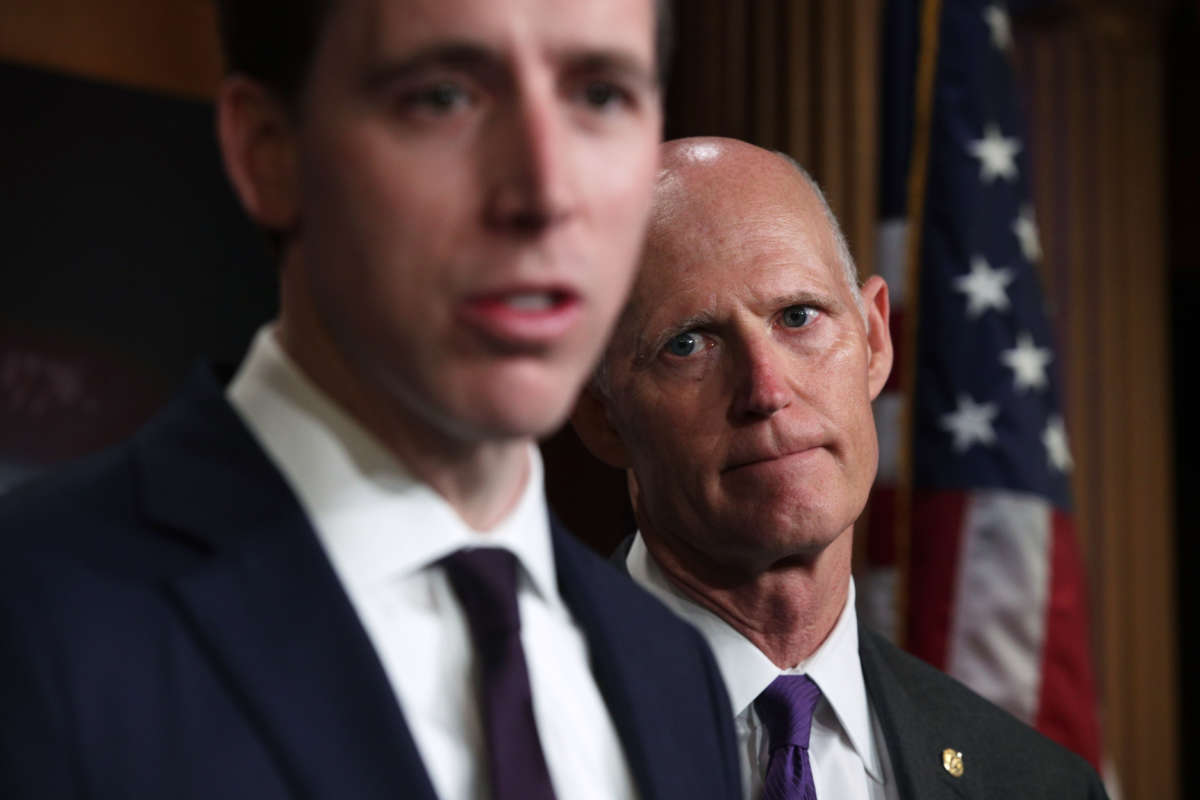Following the violent attack on the Capitol in January, dozens of corporations issued statements vowing to stop or pause political donations to Republicans who voted to overturn the 2020 election or to politicians at all. It seems some of those promises, however, were short lived.
On Monday, Popular Information reported that AT&T, Intel and Cigna appear to have already broken their pledges. In January, AT&T and Intel had vowed to suspend donations to the Republicans who voted against certifying the Electoral College vote, while Cigna said they would stop giving to those who “hindered the peaceful transition of power.”
New Federal Election Commission (FEC) filings show, Judd Legum of Popular Information reports, that it took roughly a month for the corporations to go back to making political donations to Republicans.
On February 26, Intel sent $15,000 to the National Republican Campaign Committee (NRCC), which Legum writes, is “the main fundraising vehicle” for House Republicans — 139 of whom voted to overturn the results of the election. On the February 22, AT&T donated $5,000 to a leadership PAC called the House Conservatives Fund that’s affiliated with Rep. Mike Johnson (R-Louisiana), who voted against certifying the Electoral College vote.
And on February 4, merely three weeks after their initial pledge, Cigna donated $15,000 to the National Republican Senatorial Committee (NRSC). The NRSC is run by Sen. Rick Scott (R-Florida) who voted to overturn the results of the election and, as Legum notes, had indeed “hindered the peaceful transition of power” by perpetuating the notion fueled by former President Donald Trump that the election was fraudulent. Then, three weeks later, Cigna donated another $15,000 to the NRCC.
All three corporations told Popular Information that these donations didn’t violate their pledges, despite the fact that they donated to funds that support many of the politicians who advanced false and dangerous election narratives. For instance, Legum notes, Cigna’s NRSC donation will likely go toward helping Republicans like Senators Ted Cruz (R-Texas) and Josh Hawley (R-Missouri), both of whom have continued to perpetuate the lie that President Joe Biden’s election was fraudulent.
In January, corporate PAC donations had plummeted. A Roll Call report finds that the corporations who vowed to stop or pause donations had donated a total of $2.7 million to politicians and PACs in January of 2019 versus only $50,150 in 2021 at the same point in the election cycle. (Some donations may have been made prior to the pledges following the Capitol attack.) That’s an over 98 percent drop.
Politicians definitely felt the dip in finances. Last month, The Wall Street Journal reported that politicians’ aides were scrambling to get corporations to start donating again — suggesting that lawmakers wouldn’t fight as hard against progressive policies if they were deprived of a corporate cash flow.
Political fundraisers for both sides of the aisle, including the NRCC and NRSC, are reportedly reaching out to corporations to try to win back their donations. These organizations are likely looking to fill their coffers for the 2022 election, which is shaping up to be contentious.
Still, the corporations’ decisions to renege on their vows isn’t entirely surprising, and more broken pledges may be revealed as more donations are subject to disclosure in 2021. Plus, corporate donations are only a small slice of the pie — individuals like corporate executives and employees often donate much more than the corporation itself does. That money, however, isn’t counted on behalf of the corporation. Corporate lobbyists, too, through dark money loopholes, can give money to influence candidates while avoiding corporate affiliations.
In fact, many of the corporations who vowed to halt political donations in some way also lobbied against the For the People Act, or H.R. 1, which would expose dark money influence in politics — and thus potentially expose other ways that these corporations will support politicians that their pledges renounced.
Join us in defending the truth before it’s too late
The future of independent journalism is uncertain, and the consequences of losing it are too grave to ignore. To ensure Truthout remains safe, strong, and free, we need to raise $27,000 in the next 24 hours. Every dollar raised goes directly toward the costs of producing news you can trust.
Please give what you can — because by supporting us with a tax-deductible donation, you’re not just preserving a source of news, you’re helping to safeguard what’s left of our democracy.
